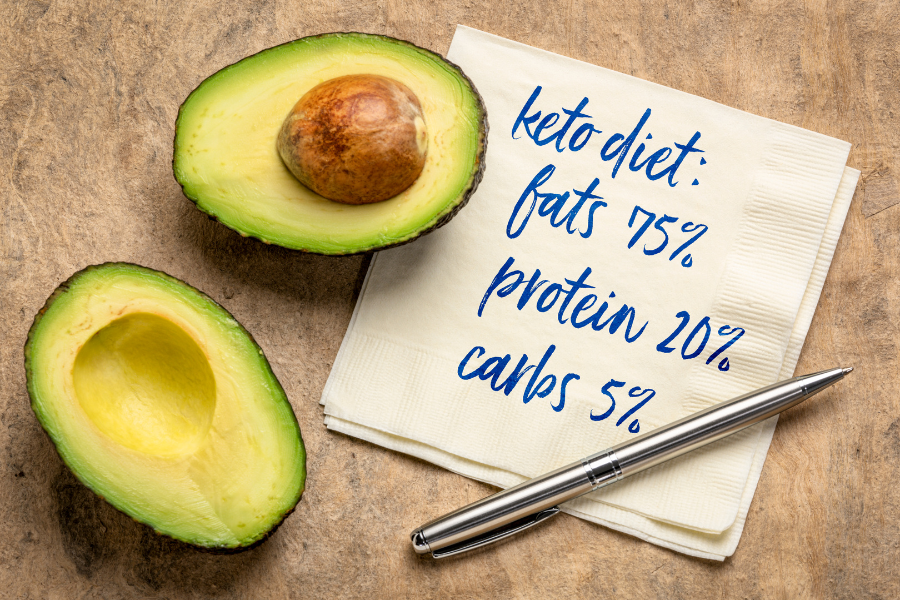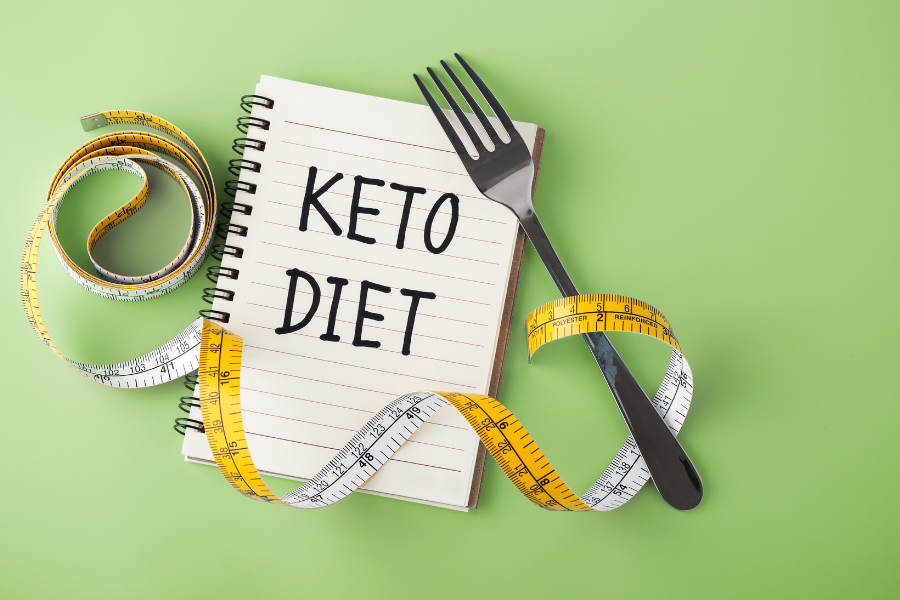Over the past few years, the ketogenic (keto) diet has skyrocketed in popularity, and it’s easy to see why. People everywhere are raving about its potential for helping shed those stubborn pounds and boosting overall health. Whether you’re looking to lose weight, manage certain health conditions, or just feel better day-to-day, the keto diet might be worth exploring.

But, like any diet, it’s not a one-size-fits-all solution. Some people thrive on it, while others find it challenging to stick with or don’t see the same benefits. In this article, we’re going to dive deep into the world of keto.
We’ll break down exactly what the keto diet is, explore the upsides and downsides, and help you figure out if it’s the right path for you. So grab a comfy seat and maybe a keto-friendly snack, and let’s get started!
What is the Keto Diet?
The keto diet is a high-fat, low-carbohydrate diet designed to put your body into a state called ketosis. In ketosis, your body burns fat for energy instead of carbohydrates. This metabolic state can lead to significant weight loss and has been linked to various health benefits.
The keto diet involves drastically reducing carbohydrate intake and replacing it with fats, prompting the body to enter a state of ketosis. Once in ketosis, the body becomes incredibly efficient at burning fat for energy, and it also turns fat into ketones in the liver, which can supply energy to the brain.
How Does the Keto Diet Work?
Typically, your body relies on carbohydrates from food to produce glucose, which is then used for energy. When you drastically reduce your carbohydrate intake and increase your fat intake, your body switches to burning fat for fuel. This process produces ketones, which are used by the body and brain for energy.
Essentially, the lack of carbs puts your body into a metabolic state known as ketosis, where fat, from both your diet and your body, is burned for energy. This shift can have a significant impact on your metabolism and overall health, making it easier to lose weight and maintain muscle mass.
Macronutrient Breakdown
The keto diet’s macronutrient distribution is crucial for maintaining ketosis. Generally, the diet is broken down into 5-10% carbohydrates, 20-25% proteins, and 70-75% fats. This macronutrient distribution forces the body into ketosis and keeps it there. By ensuring a higher intake of fats and a significantly lower intake of carbohydrates, your body is continually prompted to burn fat for energy. This strict ratio must be maintained to ensure the body stays in ketosis, allowing for the diet’s various benefits to take effect.
Benefits of the Keto Diet

1. Weight Loss
One of the primary reasons people turn to the keto diet is for weight loss. By using fat as the main energy source, the body’s fat stores can be significantly reduced. The diet also helps reduce hunger and increase satiety, which can lead to a lower overall calorie intake.
Many individuals find that they lose weight more effectively on the keto diet than on traditional low-fat diets. This is largely due to the body’s increased ability to burn stored fat for energy when carbohydrate intake is minimized.
2. Improved Mental Clarity and Focus
Many keto dieters report enhanced mental clarity and focus. Ketones are a more efficient fuel source for the brain than glucose, which can lead to better cognitive function. This mental sharpness can be particularly noticeable after the initial adaptation period when the body has fully adjusted to ketosis.
The steady supply of ketones to the brain ensures a constant and reliable source of energy, which can help improve concentration and mental stamina.
3. Stable Blood Sugar Levels
By eliminating most carbohydrates, the keto diet can help stabilize blood sugar levels. This can be particularly beneficial for individuals with type 2 diabetes or insulin resistance. Stable blood sugar levels can prevent the spikes and crashes associated with high-carbohydrate diets, leading to more consistent energy levels throughout the day.
This stability can also reduce the risk of long-term complications associated with diabetes, making it a valuable dietary approach for managing the condition.
4. Enhanced Energy Levels
When the body adapts to burning fat for fuel, it can result in more stable energy levels throughout the day. This can reduce the energy crashes often associated with high-carb diets.
With a consistent energy source from fat, many people experience sustained energy without the peaks and troughs caused by carbohydrate metabolism. This can lead to improved overall productivity and a greater sense of well-being, as energy levels remain more constant and predictable.
5. Potential Health Benefits
Research suggests that the keto diet may have other health benefits, including improved heart health, reduced inflammation, and potential neuroprotective effects. The diet’s emphasis on healthy fats and reduced carbohydrate intake can lead to better cholesterol levels and lower blood pressure.
Additionally, the anti-inflammatory effects of ketosis can help reduce the risk of chronic diseases such as arthritis and certain types of cancer. Emerging research also indicates that the keto diet may have benefits for brain health, potentially reducing the risk of neurodegenerative diseases like Alzheimer’s and Parkinson’s.
Drawbacks of the Keto Diet

1. The Keto Flu
When starting the keto diet, some people experience what is known as the “keto flu.” Symptoms can include headaches, fatigue, dizziness, nausea, and irritability. This is a temporary condition as the body adjusts to burning fat for fuel.
These symptoms are a result of the body’s transition from using glucose to using ketones for energy and typically subside within a few days to a week. Proper hydration, electrolyte balance, and gradual reduction of carbohydrates can help mitigate these symptoms.
2. Nutrient Deficiencies
The restrictive nature of the keto diet can lead to nutrient deficiencies if not carefully managed. It’s important to ensure you’re getting enough vitamins and minerals, especially from non-starchy vegetables and supplements if needed.
The lack of variety in food choices can make it challenging to obtain all necessary nutrients, potentially leading to deficiencies in vitamins such as B vitamins, vitamin C, and minerals like magnesium and potassium. To avoid this, it’s crucial to include a wide range of nutrient-dense foods and consider supplementation as necessary.
3. Digestive Issues
A high-fat diet can cause digestive issues such as constipation, diarrhea, and bloating. It’s crucial to consume enough fiber and stay hydrated. Many people find that they need to adjust their fiber intake and fluid consumption to avoid these problems.
Including plenty of low-carb vegetables and considering fiber supplements can help maintain regular digestion. Additionally, listening to your body and making gradual changes can ease the digestive transition.
4. Social and Lifestyle Challenges
The keto diet can be challenging to maintain in social settings and may require significant lifestyle adjustments. Eating out and attending social gatherings can be difficult due to the restrictive nature of the diet.
Many social events are centered around high-carbohydrate foods, making it hard to stay on track. Planning ahead, bringing your own keto-friendly dishes, and communicating your dietary needs to others can help navigate these challenges.
5. Long-Term Sustainability
The long-term sustainability of the keto diet is a concern for many. It can be challenging to maintain the diet over an extended period, and some people may struggle to adhere to the strict carbohydrate restrictions.
The diet requires a high level of commitment and can be difficult to integrate into a long-term lifestyle. Finding a balance and allowing for occasional flexibility can help make the diet more manageable and sustainable over time.
Who Should Follow the Keto Diet?

1. Individuals Looking to Lose Weight
The keto diet can be highly effective for weight loss, especially for those who have struggled with other diets. The combination of fat burning and reduced appetite can lead to significant weight reduction.
The diet’s ability to maintain muscle mass while promoting fat loss makes it an attractive option for many. Individuals looking for a sustainable and effective weight loss strategy may find the keto diet to be a valuable tool.
2. People with Type 2 Diabetes
For those with type 2 diabetes or insulin resistance, the keto diet can help stabilize blood sugar levels and improve insulin sensitivity. However, it’s essential to work closely with a healthcare provider to monitor blood sugar levels and adjust medications as needed.
The diet’s low carbohydrate content can reduce the need for insulin and other diabetes medications. Regular monitoring and professional guidance are crucial to ensure safety and effectiveness.
3. Individuals with Epilepsy
The keto diet was initially developed as a treatment for epilepsy, particularly in children who do not respond to medication. It can reduce the frequency and severity of seizures.
The diet’s ability to provide a steady supply of ketones to the brain can have a stabilizing effect on neurological function. For individuals with epilepsy, the keto diet can be a life-changing intervention when traditional treatments are ineffective.
4. Athletes and Bodybuilders
Some athletes and bodybuilders use the keto diet during cutting phases to reduce body fat while preserving muscle mass. The diet can help them achieve a leaner physique.
By maintaining muscle mass and promoting fat loss, the keto diet can be an effective strategy for those in the fitness community. However, it’s important to tailor the diet to meet specific performance and recovery needs.
5. People Seeking Improved Mental Clarity
Individuals looking to enhance their mental clarity and focus may benefit from the keto diet. The steady supply of ketones to the brain can result in improved cognitive function.
Many people report increased mental sharpness and better concentration while in ketosis. For those seeking enhanced cognitive performance, the keto diet can be a valuable tool.
Who Should Avoid the Keto Diet?
1. People with Eating Disorders
The restrictive nature of the keto diet can be problematic for individuals with a history of eating disorders. It can trigger unhealthy behaviors and should be avoided by those at risk.
The focus on strict macronutrient control and food limitations can exacerbate disordered eating patterns. Individuals with a history of eating disorders should seek guidance from a healthcare professional before considering the keto diet.
2. Individuals with Certain Medical Conditions
People with medical conditions such as pancreatitis, liver disease, or gallbladder issues should avoid the keto diet. The high-fat intake can exacerbate these conditions.
The diet’s demands on the liver and gallbladder can be problematic for individuals with these health issues. Consulting with a healthcare provider is essential for anyone with underlying medical conditions before starting the keto diet.
3. Pregnant or Breastfeeding Women
The keto diet is not recommended for pregnant or breastfeeding women, as the nutritional needs during these times are higher and more complex. Ensuring adequate nutrition for both mother and child is crucial, and the restrictive nature of the keto diet may not provide all the necessary nutrients.
A balanced and varied diet is typically recommended during pregnancy and breastfeeding to support optimal health and development.
4. People Who Rely on High-Intensity Workouts
The keto diet may not be suitable for individuals who engage in high-intensity workouts, as the lack of carbohydrates can impact performance and energy levels. Carbohydrates are a primary fuel source for high-intensity exercise, and their absence can lead to decreased performance and stamina.
Athletes and individuals involved in high-intensity training should consider their dietary needs carefully and may need to adjust their carbohydrate intake to support their activity levels.
5. Those Who Struggle with Strict Diets
If you find it challenging to stick to restrictive diets, the keto diet may not be the best choice for you. It requires a high level of commitment and adherence to specific macronutrient ratios.
The diet’s limitations can be difficult to maintain long-term, especially in social and dining situations. Finding a more flexible and sustainable dietary approach may be more effective for those who struggle with strict dietary regimens.
Tips for Starting the Keto Diet

1. Do Your Research
Before starting the keto diet, educate yourself about the diet’s principles, benefits, and potential drawbacks. Understanding the diet will help you make informed decisions and stay committed.
Researching recipes, meal plans, and the science behind ketosis can provide a solid foundation for success. Knowledge is key to navigating the challenges and maximizing the benefits of the keto diet.
2. Plan Your Meals
Meal planning is crucial for success on the keto diet. Plan your meals and snacks to ensure you’re getting the right balance of macronutrients and to avoid temptation.
Having a variety of keto-friendly recipes and ingredients on hand can make meal preparation easier and more enjoyable. Proper planning can help prevent diet fatigue and keep you motivated to stay on track.
3. Stay Hydrated
Staying hydrated is essential on the keto diet, as the body excretes more water and electrolytes when in ketosis. Drink plenty of water and consider supplementing with electrolytes.
Dehydration can exacerbate symptoms of the keto flu and affect overall well-being. Maintaining proper hydration can help support your body’s adjustment to ketosis and improve overall health.
4. Monitor Your Progress
Track your progress by monitoring your weight, body measurements, and ketone levels. This can help you stay motivated and make necessary adjustments to your diet.
Regular monitoring can provide valuable insights into how your body is responding to the diet and help identify areas for improvement. Keeping a journal or using a tracking app can be useful tools for staying accountable and informed.
5. Seek Support
Consider joining a keto diet support group or finding a diet buddy. Having support can make the transition easier and provide motivation to stay on track.
Sharing experiences, tips, and encouragement with others can enhance your journey and provide a sense of community. Support networks can help address challenges and celebrate successes, making the keto diet more enjoyable and sustainable.
Common Mistakes to Avoid on the Keto Diet
1. Not Eating Enough Fat
One of the biggest mistakes people make on the keto diet is not consuming enough fat. Fat is the primary energy source on this diet, so it’s essential to include healthy fats in your meals.
Neglecting fat intake can lead to energy deficits and make it harder to stay in ketosis. Ensuring a sufficient intake of avocados, nuts, seeds, and healthy oils can support your dietary goals and overall health.
2. Eating Too Many Carbs
Even small amounts of carbohydrates can kick you out of ketosis. Be mindful of hidden carbs in foods and track your intake to ensure you’re staying within the recommended range.
Reading labels and being aware of carbohydrate content in various foods is crucial for maintaining ketosis. Consistent monitoring and portion control can help avoid unintentional carb consumption and support dietary success.
3. Ignoring Electrolyte Needs
Electrolyte imbalances can occur on the keto diet due to increased excretion of water and electrolytes. Ensure you’re getting enough sodium, potassium, and magnesium to avoid symptoms like headaches and fatigue.
Including electrolyte-rich foods and considering supplements can help maintain balance and prevent the “keto flu.” Proper electrolyte management is essential for overall well-being and the effectiveness of the keto diet.
4. Not Getting Enough Fiber
The keto diet can be low in fiber, leading to digestive issues like constipation. Include non-starchy vegetables and consider fiber supplements if needed.
Maintaining adequate fiber intake is crucial for digestive health and can help prevent discomfort. Including a variety of low-carb, high-fiber foods in your diet can support regularity and overall digestive function.
5. Focusing Only on Macros
While it’s essential to track your macronutrients, don’t neglect the quality of your food. Focus on whole, nutrient-dense foods to ensure you’re getting the vitamins and minerals your body needs.
A balanced approach that prioritizes both macros and micronutrients can enhance the benefits of the keto diet. Choosing high-quality, minimally processed foods can support overall health and well-being.
Final Thoughts
The keto diet can offer numerous benefits, including weight loss, improved mental clarity, and stable blood sugar levels. However, it’s not suitable for everyone and comes with potential drawbacks such as the keto flu, nutrient deficiencies, and digestive issues. It’s important to carefully consider your health needs and consult with a healthcare provider before starting the diet.
For those who find the keto diet beneficial, following the tips and avoiding common mistakes can help ensure success. Remember, a well-planned keto diet should focus on whole, nutrient-dense foods and include adequate hydration and electrolytes. Whether you’re looking to lose weight, manage diabetes, or improve cognitive function, the keto diet may be a valuable tool in your health and wellness journey. By understanding its principles, planning carefully, and seeking support, you can navigate the challenges and reap the benefits of this popular dietary approach.







